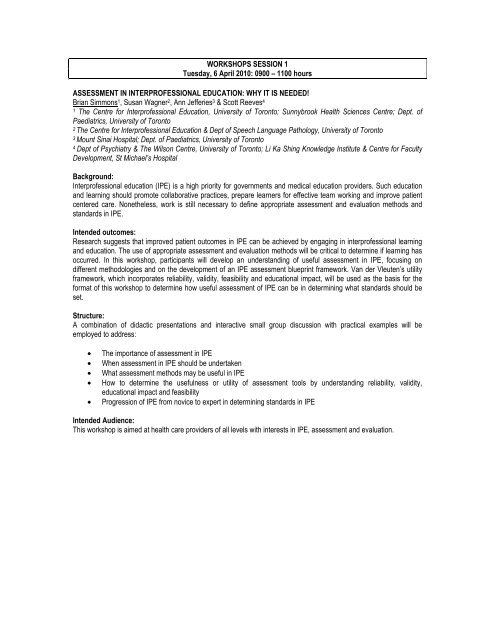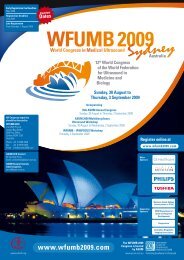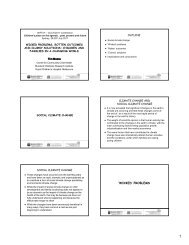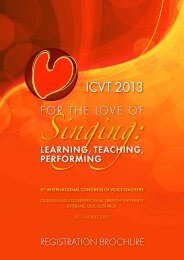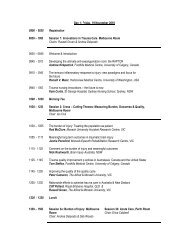Workshop abstracts - morning - Conference On The Net
Workshop abstracts - morning - Conference On The Net
Workshop abstracts - morning - Conference On The Net
You also want an ePaper? Increase the reach of your titles
YUMPU automatically turns print PDFs into web optimized ePapers that Google loves.
WORKSHOPS SESSION 1<br />
Tuesday, 6 April 2010: 0900 – 1100 hours<br />
ASSESSMENT IN INTERPROFESSIONAL EDUCATION: WHY IT IS NEEDED!<br />
Brian Simmons 1 , Susan Wagner 2 , Ann Jefferies 3 & Scott Reeves 4<br />
1 <strong>The</strong> Centre for Interprofessional Education, University of Toronto; Sunnybrook Health Sciences Centre; Dept. of<br />
Paediatrics, University of Toronto<br />
2 <strong>The</strong> Centre for Interprofessional Education & Dept of Speech Language Pathology, University of Toronto<br />
3 Mount Sinai Hospital; Dept. of Paediatrics, University of Toronto<br />
4 Dept of Psychiatry & <strong>The</strong> Wilson Centre, University of Toronto; Li Ka Shing Knowledge Institute & Centre for Faculty<br />
Development, St Michael’s Hospital<br />
Background:<br />
Interprofessional education (IPE) is a high priority for governments and medical education providers. Such education<br />
and learning should promote collaborative practices, prepare learners for effective team working and improve patient<br />
centered care. Nonetheless, work is still necessary to define appropriate assessment and evaluation methods and<br />
standards in IPE.<br />
Intended outcomes:<br />
Research suggests that improved patient outcomes in IPE can be achieved by engaging in interprofessional learning<br />
and education. <strong>The</strong> use of appropriate assessment and evaluation methods will be critical to determine if learning has<br />
occurred. In this workshop, participants will develop an understanding of useful assessment in IPE, focusing on<br />
different methodologies and on the development of an IPE assessment blueprint framework. Van der Vleuten’s utility<br />
framework, which incorporates reliability, validity, feasibility and educational impact, will be used as the basis for the<br />
format of this workshop to determine how useful assessment of IPE can be in determining what standards should be<br />
set.<br />
Structure:<br />
A combination of didactic presentations and interactive small group discussion with practical examples will be<br />
employed to address:<br />
• <strong>The</strong> importance of assessment in IPE<br />
• When assessment in IPE should be undertaken<br />
• What assessment methods may be useful in IPE<br />
• How to determine the usefulness or utility of assessment tools by understanding reliability, validity,<br />
educational impact and feasibility<br />
• Progression of IPE from novice to expert in determining standards in IPE<br />
Intended Audience:<br />
This workshop is aimed at health care providers of all levels with interests in IPE, assessment and evaluation.
WORKSHOPS SESSION 1<br />
Tuesday, 6 April 2010: 0900 – 1100 hours<br />
MENTOROPOLY: A TRAINING RESOURCE FOR BOTH MENTORS AND STUDENTS<br />
Min Ku 1 , Katherine Chandler 2 , Vaissy Jelbart 3 & Jillian Ransom 4<br />
1 Austin Health<br />
2 Maroondah Hospital<br />
3 Radiation <strong>On</strong>cology Victoria<br />
4 Peter MacCallum Cancer Centre<br />
Introduction:<br />
Educational gaming is a process that appears not to be something which has been recognised as a valid teaching tool.<br />
However given that we recognise that there are different types of learning styles, further exploration was warranted.<br />
Students today come from a totally different perspective from say five years ago. <strong>The</strong>y are all technologically savvy,<br />
and love things that move quickly and keep them engaged and stimulated. To try and teach them using traditional<br />
didactic approaches is a massive challenge. Everything is needed or expected now, and this is just not possible in a<br />
clinical environment, where it is not about the student, but the patient.<br />
Method:<br />
In order to bridge the gap between the mentors and the students, a novel approach was taken to enhance learning for<br />
these groups of people through the use of a designed board game. This board game is used to simulate incidences<br />
that occur within a clinical environment, and is used as a springboard for discussion with both mentors and students<br />
Discussion:<br />
Through this innovative teaching strategy a dynamic learning environment is created, enabling an active learning<br />
process, in a “safe” environment, which can result in immediate feedback. Experiential learning allows students and<br />
also mentors to understand a concept, generalise and apply the understanding to new situations, or combine the<br />
understanding with other concepts they have learned. Not only are games viewed as providing psychological benefits,<br />
particularly in motivating younger workers to get involved with workplace tasks, it creates development of clinical skill<br />
mastery.<br />
Results:<br />
This presentation will explore some of the benefits resulting from the board game mentoropoly, and demonstrate it’s<br />
usefulness, as a novel and fully engaging method to enhance the learning of new students and interns in a clinical<br />
environment.
SIMULATIONS FOR INTERPROFESSIONAL LEARNING<br />
Judy Stone<br />
ACT Health, ACT, Australia<br />
WORKSHOPS SESSION 1<br />
Tuesday, 6 April 2010: 0900 – 1100 hours<br />
This interactive workshop has the potential to provide an opportunity for participants to create, share and trial<br />
simulations for interprofessional learning. <strong>The</strong> emphasis would be upon simulations which are low tech and paper<br />
based. Participants would be encouraged to include scenarios which are community and primary health care based,<br />
dealing with chronic disease, complex health needs and aged care. <strong>The</strong>se simulations would ideally be flexible and<br />
applicable to both undergraduates and qualified health workers. <strong>The</strong>y would aim to promote communication, team work<br />
and situational awareness in context.<br />
This workshop would cover the consideration of design, delivery, and evaluation of simulations. Through an interactive<br />
process existing simulations could be shared, trialled, critiqued and improved. Those who would like to create a<br />
simulation but have no experience will be supported by those who have experience in this area. This would be a forum<br />
to exchange ideas, prior experience (both good and bad) and work out what works best to achieve the desired learning<br />
outcomes. It could see the beginning of an international community of practice specifically interested in the design,<br />
delivery and evaluation of interprofessional simulations.<br />
Outline of proposed program:<br />
Introductions<br />
Icebreaker ‘mini’ simulation (in pairs)<br />
What is a simulation Discussion & consensus ½ hour<br />
Sharing of prior experience with simulations<br />
Discussion of learning objectives and alignment<br />
Examples of simulations explained and presented<br />
Trial of up to 5 simulations in small groups<br />
Feedback and debrief of trialled simulations<br />
Whole group construction of a simulation<br />
Trial and modification of simulation<br />
Debrief and evaluation<br />
½ hour<br />
½ hour<br />
½ hour<br />
Post conference establishment of electronic sharing network of simulations, organised by workshop facilitator.
WORKSHOPS SESSION 1<br />
Tuesday, 6 April 2010: 0900 – 1100 hours<br />
TOMORROWS INTERPROFESSIONAL EDUCATORS: ENSURING QUALITY THROUGH THOROUGH<br />
PREPARATION FOR THOSE WHO LEAD INTERPROFESSIONAL LEARNING<br />
Elizabeth Anderson, Marilyn Hammick, Elizabeth Howkins, Susanne Lindqvist, Helena Low & Jill Thistlethwaite<br />
Centre For <strong>The</strong> Advancement Of Interprofessional Education (CAIPE), UK<br />
Aim:<br />
This workshop will highlight the pedagogic challenges of facilitating interprofessional learning (IPL) and offer solutions<br />
for developing advanced competence in leading interprofessional teaching. <strong>The</strong> workshop is suitable for all those with<br />
a quality assurance role in interprofessional education (IPE).<br />
Background:<br />
Evidence indicates that staff development in the facilitation of IPE is essential and specific knowledge, attitudes and<br />
skills are required by facilitators to ensure effective IPL. <strong>The</strong> majority of teachers who engage with IPE have originally<br />
taught profession specific curricula from which they may develop a limited teaching repertoire that can restrict their<br />
ability to transfer their skills to meet interprofessional learning outcomes. Many are unfamiliar with the small group<br />
teaching methods used in IPE and some may be unaware of the value-laden interactions that naturally occur as<br />
students learn about, from and with each other. In this workshop board members from the UK Centre for the<br />
Advancement of Interprofessional Education (CAIPE) will share their range and depth of experiences in IPE staff<br />
development with participants, offering evidence based solutions for effective preparation of IPL facilitators.<br />
Content:<br />
Participants will engage in interactive small group tasks and explore the challenges for quality assurance of:<br />
• ensuring the right attitudes and commitment for IPE among those who teach<br />
• the skills necessary to support IPL<br />
• how these skills might be developed and nurtured<br />
• the alignment of IPE teaching, learning and assessment<br />
• ensuring year-on-year quality through excellent IPL facilitation.<br />
• supporting role models within competing practice and academic priorities<br />
• career pathways for leaders of IPE<br />
• the research challenges of engaging, supporting and maintaining effective IPL facilitation.<br />
Outputs:<br />
Outcomes will address the on-going concerns for quality assurance related to how IPL is facilitated. Participants will<br />
leave with a set of Top Tips in IPE staff development.
WORKSHOPS SESSION 1<br />
Tuesday, 6 April 2010: 0900 – 1100 hours<br />
HERDING CATS: INTEGRATION OF MULTIPLE PROFESSIONS WHILE EFFECTIVELY DELIVERING CASE-<br />
BASED LEARNING<br />
Susan Mackintosh 1 , Tina Meyer 2 & John Tegzes 3<br />
1 College of Osteopathic Medicine of the Pacific, Western University of Health Sciences, Pomona, California, USA<br />
2 College of Allied Health Professions, Western University of Health Sciences, Pomona, California, USA<br />
3 College of Veterinary Medicine, Western University of Health Sciences, Pomona, California, USA<br />
Abstract (2-hour workshop):<br />
In helping to prepare healthcare professional students for an interprofessional team based approach to healthcare<br />
delivery, Western University of Health Sciences (WesternU) has adopted a small group, case-based approach to<br />
enhance the learning experience. <strong>The</strong> unique challenges to this approach include designing and facilitating cases that<br />
not only enhance learning for all nine of our healthcare professional programs, but also provides opportunities to<br />
explore healthcare issues, and captivates students’ interest. WesternU has created a process for case development<br />
whereby students can apply critical thinking skills for a multitude of competencies that are crucial to any healthcare<br />
professional.<br />
To demonstrate this method, workshop participants will develop, implement, and facilitate a condensed case applying<br />
a timely, realistic scenario of an emerging infectious disease threat to both human and animal populations. <strong>The</strong><br />
workshop will promote small group learning, integrated curricula, and group development.<br />
<strong>Workshop</strong> participants will:<br />
Review and understand one model of a case development process;<br />
Engage in a condensed version of a case-based learning process;<br />
Facilitate critical thinking and non-cognitive values and behaviours, including:<br />
o Communication and collaboration, such as building trust with other members<br />
o Scope of practice/review of professional roles; showing acceptance and interest in other<br />
people’s roles<br />
o Interprofessional teamwork; listening to others<br />
o Legal/ethical issues<br />
o Quality of life issues<br />
o Inter-species, one health issues<br />
o Cultural awareness; enhancing group dynamics<br />
o Community and global based healthcare systems; sharing your vision with other<br />
members<br />
o Awareness of psycho-social and socio-economic issues


